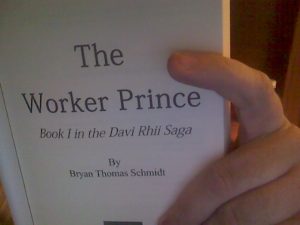In previous excerpts, we’ve met the protagonist, Davi Rhii, and his friends and family and rival Bordox. Now let’s meet the main antagonist, Davi’s uncle Xalivar. Xalivar is a complicated character. Hopefully this will give you an idea what Davi’s up against. In this scene, Davi has been called back before his uncle, High Lord Councilor of the Borali Alliance, because he disobeyed orders and left his post on a distant base where Xalivar sent him to avoid criminal charges to come back and wrestle with his new identity as slave-born (worker-born).
Manaen escorted Davi as far as the throne room, but let him enter alone. Xalivar stood beside a window, staring out at the city.
“I gave you your orders,” Xalivar said, without turning to face him. Davi heard the anger in his voice.
“Can’t we talk about this?”
“Soldiers obey orders or they are disciplined. Don’t think because I’m your uncle, you’ll be given special treatment.”
“I’ve already been given special treatment,” Davi said.
Xalivar whirled around, glaring at him as his fists clenched. “Do you know what I had to go through to get the Council not to pursue murder charges against you?”
“I appreciate everything you’ve done for me.”
“And this is how you show your gratitude?” Xalivar turned away again.
“I serve you best by being honest with you, don’t I?”
“You serve me best by doing as I instruct you without raising unnecessary questions,” Xalivar said.
Davi flinched at his uncle’s anger. What could he say to make him understand? “I’ve been reading history. I don’t understand why things are the way they are,” Davi said.
“Maybe it’s not your job to understand.”
“Before the colonists left Earth to settle on other planets, the Legallians and Vertullians were at peace for twelve years,” Davi continued. “When the Vertullians discovered they’d settled the planet next door to us, they didn’t fight, they sued for peace. Instead, we conquered them and turned them into slaves.”
Xalivar turned back to him. Their eyes met. “They cannot be trusted.”
“They sued for peace and we betrayed them, yet they can’t be trusted?” Davi saw from his eyes that Xalivar really believed it.
“Twelve years of peace during a time when everyone was distracted by other concerns,” Xalivar said. “After hundreds of years of wars.”
“Extremists and terrorists brought us together. Why would we forget all that when we settled here?”
“Do you know how many of our people have died at their hands? How many communities they destroyed?” Xalivar demanded.
“How many of them have we killed? Can’t the past ever be the past?” Davi asked. He’d begun to wonder. His uncle’s anger seemed pretty intense over something that happened so long ago. “Twenty years ago, I was supposed to die because of your decree, yet here I am. You let it go and protected me, because I’m your nephew.” Xalivar’s face changed when Davi mentioned the decree. Had he forgotten? Maybe he wishes I hadn’t survived.
“I protected you, yes, and here you are trying to undo everything I’ve done!” Xalivar threw up his hands in dismay as his pupils narrowed and his face turned gray with worry.
“How can I stand by when my own family is living in slavery?”
“Do you wish so badly to join them in their plight?” Xalivar said. “Everything I’ve worked for, everything my father and grandfather worked for could be undone by this, Xander! Do you not care about this family any longer since you’ve found a new one?” They both turned at the sound of the door opening behind them.
Miri’s feet shuffled on the carpet as she rushed in. “Why didn’t you tell me you were here?” she said, looking at Davi.
“I didn’t have the chance yet, Mother,” Davi said.
“He was too busy arguing the evils of our oppressive Alliance with his uncle,” Xalivar said. “He won’t let this go. I should have raised him myself, disavowed him of his moral illusions.” He stared accusingly at Miri.
“I raised him to think for himself,” Miri said.
“Well, he’s decided this family is the enemy now,” Xalivar said, fists clenching again.
“You’re still my family. I care about you,” Davi said with frustration. Did his uncle really believe that?
Xalivar waved dismissively to Miri. “I cannot do what he asks. You talk sense into him.” He turned and stopped beside the door to his private chambers, punching a code. The door slid up and Xalivar disappeared inside, leaving them alone.
“You’re trying to fight a system which has been in place for generations, Davi,” Miri said.
“It’s wrong, mother.”
“It won’t change overnight,” Miri said.
Davi knew she was right but was convinced he had to try. “Someone has to speak for the workers. People know who I am; maybe I can make them listen.”
“Or you will make more enemies than you ever imagined,” Miri said.
“So you would have me stand by and do nothing?”
“No, but I would have you recognize there will be more to convince than just your uncle,” Miri said, frustrated.
“I have to start somewhere.” Davi turned away, knowing she was right. “I won’t give up. I can’t.”
“Do you want to go to prison? Do you want to be killed?” Miri’s voice was tinged with desperation; worry filled her eyes.
“I’m willing to do what it takes to change things for my people,” Davi said as their eyes met.
“The Lords or the workers?”
“Both, Mother. I belong to both,” he said with a sigh.
“I can’t protect you.” Her voice was pained.
“I know. I would never hurt you, mother; I hope you know that.” He looked at her with love and smiled.
“I only want what’s best for you. Your uncle, too,” Miri pleaded.
“Can’t you see I have to do this?” Davi said, as tears ran down her cheeks. He hurt for her. He raised his arms and she rushed into his embrace. He stayed there holding her awhile.
***
Xalivar watched the Royal Shuttle depart with Davi aboard from his private quarters. How could he have been so blind? He’d forgotten all about the decree! He’d forgotten all about the nightmares which kept him awake, night after night. He’d never given much credence to dreams, but after his scientists had reported an increase in male births on Vertullis, Xalivar issued a decree and sent his Special Police squads to destroy all first-born males. They’d seemed so real to him then, but twenty-one years had passed. No one had arisen to challenge him in the decade that followed. He’d ultimately come to believe the dreams had been nonsense, but now…
How could he have been so wrong? He would do whatever it took to protect the Alliance. He loved the boy, but love wasn’t enough sometimes. Davi would have to be watched, although he didn’t want him harmed. Not yet. He hoped it wouldn’t come to that, but he was prepared to do what was necessary. Miri would object, of course, but neither she nor her son really grasped what was at stake. Anyone was expendable if they rebelled. It couldn’t be tolerated.
The Council was scheduled to meet that afternoon, and he knew what must be done. He had to keep Davi close, and he had the perfect means right under his nose. Funny, he’d almost failed to see that, too. He’d been all ready to order Davi back to Plutonis. I must be growing weary. I need to get more rest. I have to stay on top of such things. He smiled. Yes, it was the perfect plan. So perfect, it would almost seem like a natural course of events beyond even Xalivar’s control.
326 pp · ISBN 978‐0‐9840209‐0‐4 ·Trade Paperback/Epub/Mobi · $14.95 tpb $3.99 Ebook · Publication: October 4, 2011 · Diminished Media Group
Available now for 20% off on preorders!!!
Trade paperback only
EPUB or MOBI — please specify in notes on order




